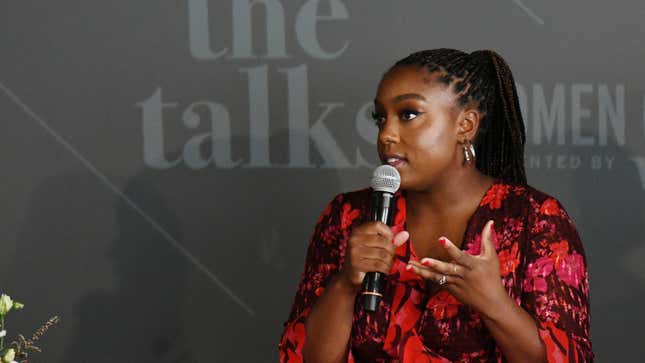
Well before she was named editor-in-chief of Teen Vogue, Lindsay Peoples Wagner was calling out disparities and microaggressions within the fashion industry; most notably with her August 2018 report for The Cut, “Everywhere and Nowhere: What it’s really like to be Black and work in fashion,” revealing what Black creatives, executives and models were really experiencing behind the scenes of some of the world’s most recognizable brands. And in the wake of the ongoing uprisings against racial injustice in this country (and others), Wagner is now calling upon industry leaders to do more than issue tepid statements and basic “Diversity & Inclusion” initiatives, joining forces with Sandrine Charles of Sandrine Charles Consulting to found the Black in Fashion Council.
“The Black in Fashion Council was founded to represent and secure the advancement of black individuals in the fashion and beauty industry,” reads the organization’s mission statement. “As a collective, we envision a world in which Black people in fashion and beauty spaces can be open and honest, guaranteed equal rights, and be celebrated for our voices.
“While we are working on our end, we encourage people in the industry to rise to the occasion to sustain long-term change,” the statement concludes.
How does this new council—notably, one of several new black-led fashion initiatives that have launched in recent weeks—plan to compel those changes? According to Vogue, Wagner and Charles have partnered with the Human Rights Campaign “to establish an equality index score that will provide benchmarking around corporate policies and practices ‘pertinent to the inclusivity of Black employees.’” The Council will also produce “a digital directory of Black fashion and beauty professionals that brands can purchase to assist with diversifying their staffs.”
As Vogue reports:
The Black in Fashion Council will produce a yearly public report to track the work that companies who’ve signed a three-year commitment pledge are doing to foster representation of Black employees at all levels. The Council’s executive board, whose members come from all aspects of the fashion and beauty industries, and includes names like GQ deputy fashion director Nikki Ogunnaike, costume designer Shiona Turini, and Brandice Daniel, the founder of Harlem’s Fashion Row, will help facilitate the work that the companies have agreed to do.
“The Human Rights Campaign already has a Corporate Equality Index for people with disabilities and the LGBTQ community that companies like Kering are already a part of,” Peoples Wagner tells Vogue. “This would be a way to continue to give companies a report card of accountability without them feeling like they’re being shamed into it, and giving them the actual resources of what people are saying they want to see changed...The thinking behind this is we would be using our own networks to be able to have these conversations with people and encourage them to be part of the Council and be part of the corporate equality index.”
Vogue goes on to report that the Council has already earned the support of industry leaders the Council of Fashion Designers of America (CFDA)—this, after the CFDA garnered backlash to its own early June statement promising to address the “systemic racism” in the industry. In response, 250 Black industry professionals signed a letter in support of the Kelly Initiative (named for late Black fashion designer Patrick Kelly), “a four-point plan to invaluably enrich the industry via the active inclusion of Black talent across wide-ranging strata and sectors of fashion.”
The letter read, in part (pdf):
We will no longer be relegated to the backseat, or worse yet, completely sidelined altogether; we have ceased waiting indefinitely for others to grant us equal access to opportunity, locked out of the very rooms within which we should lead the collaborative work of righting those wrongs we endure.
In its over 2 years of refusing to consider and implement key equity realization programs aimed at leveling the playing field for the community of Black fashion professionals, the CFDA has allowed exploitative cultures of prejudice, tokenism, and employment discrimination to thrive, unbridled by the sort of watchdog intervention expected of an industry umbrella organization. Now, hasty attempts at doing that work—initiatives released on June 4th, so insufficiently conceived that they lacked a very name—evidence that the CFDA is falling far short of the broader culture’s rapidly solidifying zero-tolerance policy for Anti-Blackness.
The Black in Fashion Council adds even more fuel to this growing fire in the notoriously Eurocentric fashion industry, already boasting 400 individual stakeholders. And as Charles tells Vogue, the more the merrier.
“We’d like everybody to participate; we don’t want to segment based on larger brands or smaller brands. We really want this to be a collective of everyone, so we built out an industry standard of what we want diversity and inclusion to look like moving forward,” she says, adding: “What sets us apart is we want to show that we’re in solidarity with you, we want to not only support your group but empower you with resources that you may or may not have. That’s really important: to have a network of people that are working for the same good with egos aside.”

